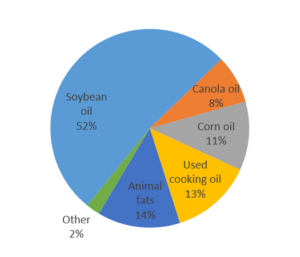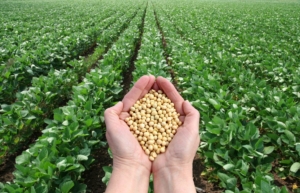BioDiesel Overview
BioDiesel refers to a type of alternative fuel that is created by using plant oils and byproducts. Some common plant oils that are used in BioDiesel production are soy, corn, and palm oils.

Above is a pie chart indicating some of the most common feedstock for BioDiesel.
Economic Benefits
Following the global shift towards less carbon dependency, biodiesel has become an attractive fuel source. Countries have begun exporting and importing this commodity more commonly. China’s biodiesel exports had risen significantly in price from less than 7,000 yuan/ton ($1,050 USD) in January of 2021 to 12,000 yuan/ton ($1,723 USD) in July of 2022. This was primarily due to the lack of available petroleum during the ongoing Russo-Ukranian war, and has since dropped back down. As the production of biodiesel is based on the growth of energy crops, most countries in the world that have available land could theoretically produce their own biofuel, creating less dependency on fuel imports from other countries.

Environmental Impacts
- BioDiesel is nontoxic and biodegradable, if it is spilled, it will break down into harmless substances.
- BioDiesel, when burned as fuel, produces fewer emissions of toxins, sulfur dioxide, and particulates than fossil-fuels. BioDiesel results in roughly ~80% less emissions while used in vehicles when compared to petroleum diesel.
- BioDiesel combustion has the potential to result in slightly higher amounts of nitrogen oxides compared to petroleum diesel.
- As BioDiesel is created by using plants, the production process could be considered environmentally friendly, as the feedstock or energy crops used can provide carbon sequestration benefits.

Conversion
BioDiesel is a fantastic alternative for regular petroleum diesel. Though engine power and torque operate at a 3% – 5% loss while using BIoDiesel, the strain on the engine from the use of this fuel is significantly less than the wear and tear of typical petroleum diesel. There is no need to alter your engine at all, BioDiesel can be used in any typical diesel engine. The main issue that engines seem to face while using BioDiesel is that the fuel can become gel-like in cold conditions, however, using certain ingredients can help to lubricate the fuel and prevent gelling. Producing BioDiesel for local and personal use can prove beneficial for farmers and other people in agriculture. The US is pushing towards only allowing domestically created BioDiesel to recieve tax credits for its production. The use of BioDiesel can also reduce a farmers expenditure in yield per hectare significantly.
Join Our Weekly Announcements For More Clean Fuel Resources and Information
Next Week: Natural Gas
Time: 3:00
Date: May 20th


